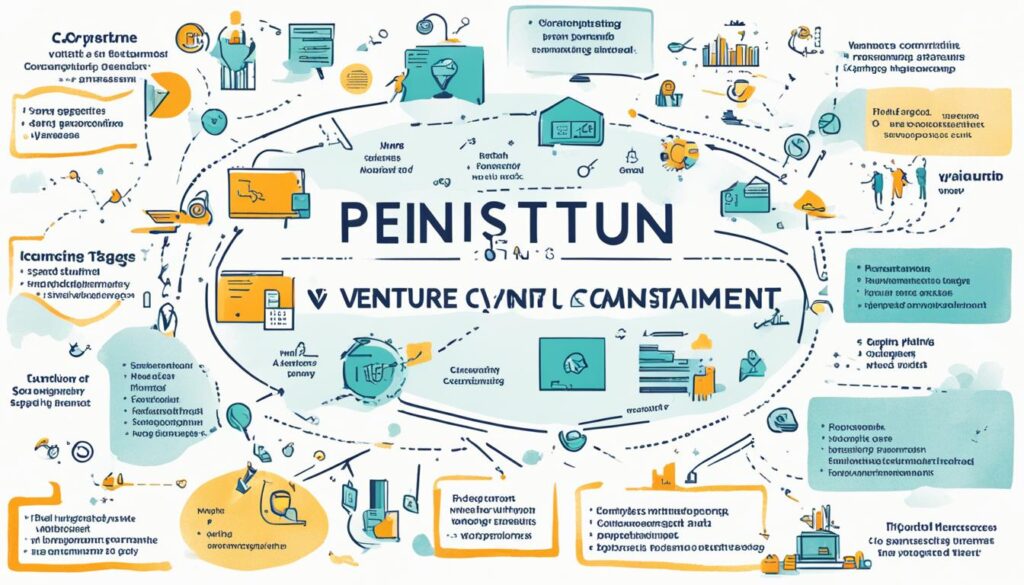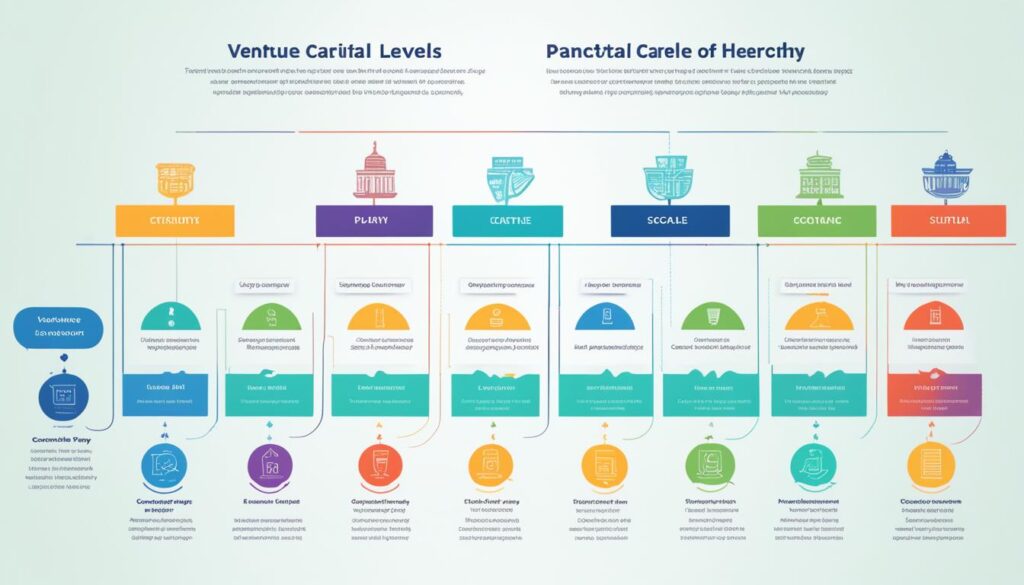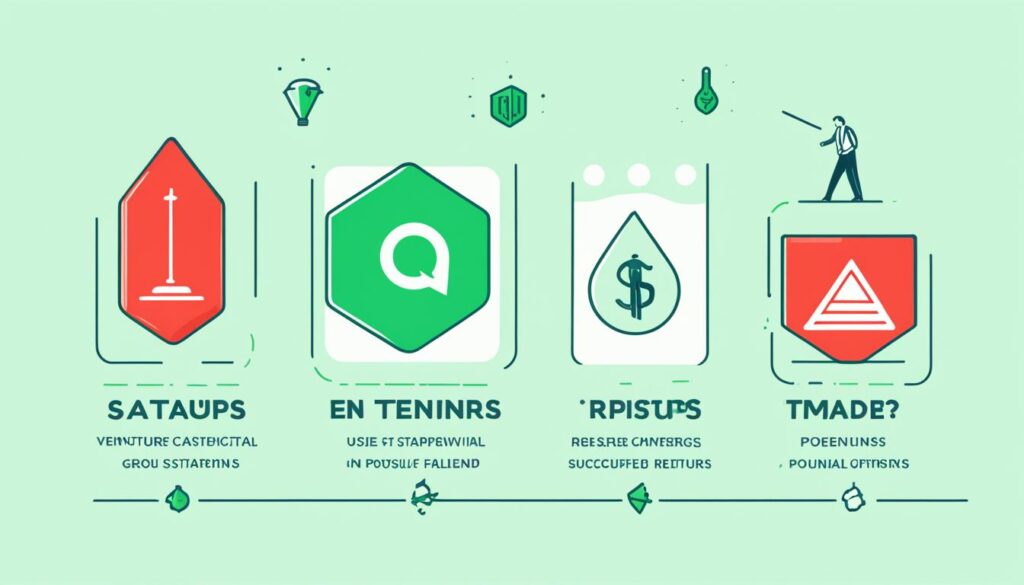Have you ever wondered how much the venture capitalists (VCs) who invest in the next big startup actually make? Venture capital is a high-risk, high-reward world, where the potential for massive returns collides with the sobering reality that most investments will fail. So, what kind of compensation can one expect in this dynamic industry?
Venture capital is a subset of private equity that refers to the financing startups and small businesses with exceptional growth potential receive in exchange for an equity stake. VC investors, called venture capitalists, often include VC firms, high-net-worth individuals (angel investors), and other financial institutions. These firms raise capital from Limited Partners, such as pension funds, endowments, and family offices, and then invest in early-stage, high-growth-potential companies in exchange for equity.
Since the risks are so high, VCs expect most of their investments to fail, but they aim to find the next Google, Facebook, or Uber to earn exceptional returns. Venture capitalists spend their time on the process of raising funds, finding startups to invest in, negotiating deal terms, and helping the startups grow.
### Key Takeaways
– Venture capital (VC) is a subset of private equity that provides financing to startups and small businesses with exceptional growth potential in exchange for equity.
– VC investors, called venture capitalists, include VC firms, high-net-worth individuals (angel investors), and other financial institutions.
– VC firms raise capital from Limited Partners, such as pension funds, endowments, and family offices, and then invest in early-stage, high-growth-potential companies.
– Venture capitalists spend their time on raising funds, finding startups to invest in, negotiating deal terms, and helping the startups grow.
– The high-risk, high-reward nature of venture capital means VCs expect most of their investments to fail, but they aim to find the next major tech or healthcare success stories.
Understanding Venture Capital Firms
Venture capitalists play a pivotal role in the startup ecosystem, devoting their time to a variety of key responsibilities. From sourcing new startups to invest in to conducting due diligence and executing deals, venture capitalists (VCs) are actively involved in the entire investment lifecycle. Additionally, they provide critical support to their portfolio companies, leveraging their expertise and network to help startups grow and succeed.
What Do Venture Capitalists Do?
The daily tasks of a venture capitalist can be divided into six main areas: sourcing new startups to invest in, conducting due diligence and deal execution, supporting portfolio companies, networking and brand-building, fundraising and LP relations, and internal operations. Junior VCs, such as Analysts and Associates, typically focus more on sourcing and deal execution, while senior VCs, such as Partners, dedicate more time to portfolio company support and strategic decision-making.
Why Venture Capital?
Venture capital is often described as a “get rich slowly” job, as the potential upside can take years or even decades to materialize. VCs are in pursuit of the next major tech or healthcare success stories, aiming to find the next Google, Facebook, or Uber. The main reasons companies seek venture capital include access to funds, reduced risk, and the opportunity to generate attractive returns for investors in exchange for equity in their business.

Venture Capital Career Hierarchy
The
in the venture capital industry typically follows a structured hierarchy, with various roles and responsibilities at each level. Understanding this hierarchy can provide valuable insights into the career progression and compensation structure within the VC field.
Analyst
At the entry-level, Analysts are responsible for conducting industry research, number crunching, and providing support work. While they have limited involvement in the deal process, Analysts play a crucial role in gathering and analyzing data to assist the investment team.
Associate (Pre-MBA)
The next step in the hierarchy is the Pre-MBA Associate position. These professionals focus on sourcing potential deals and carefully evaluating investment opportunities to weed out poor investments.
Senior Associate (Post-MBA)
After gaining experience as a Pre-MBA Associate, individuals can progress to the Senior Associate (Post-MBA) role. Senior Associates act as apprentices to Principals and Partners, gaining valuable hands-on experience in the and contributing to the deal execution process.
Principal or Vice President (VP)
Senior investment team members, known as Principals or Vice Presidents (VPs), are engaged in the negotiation and execution of deals. They play a vital role in the decision-making process and serve as a bridge between the junior investment team and the firm’s leadership.
Partner or Junior Partner
Partners or Junior Partners are deeply involved in the management of portfolio companies and contribute to firm-level strategic decisions. They leverage their extensive experience and networks to support the growth and success of the companies in which the VC firm has invested.
General Partner or Managing Director
At the top of the hierarchy are the General Partners or Managing Directors. These individuals are the primary decision-makers, responsible for fundraising, public relations, and overseeing the performance of the firm’s portfolio companies.

How much do VC firms pay?
Venture capital (VC) compensation is a complex and multifaceted structure, consisting of base salaries, year-end bonuses, and a lucrative component known as carried interest (or “carry”). Understanding this compensation model is crucial for anyone aspiring to a career in the venture capital industry.
Base Salaries and Bonuses
The base salaries and bonuses paid by VC firms are typically derived from the management fees they charge their limited partners (LPs). These fees cover the day-to-day operations of the firm, including the salaries and bonuses of the investment team. Venture capital salaries can vary widely depending on the role and seniority level, with Analysts earning the lowest base pay and Principals/VPs and Partners/Junior Partners earning the highest.
Carried Interest (Carry)
The real potential for wealth in venture capital, however, lies in the venture capital carry – a percentage of the firm’s investment profits that is distributed to the investment team. This “carried interest” can substantially increase the total compensation of senior-level venture capitalists, such as General Partners and Managing Directors, who are responsible for the firm’s most successful investments. VC bonuses are also influenced by the firm’s carry, as a portion of the carry is often used to fund year-end bonuses for the investment team.
It’s worth noting that the distribution of carry can vary significantly across different VC firms and investment strategies. Some firms may allocate a larger share of carry to their most senior partners, while others may distribute it more evenly across the team. Understanding the nuances of a firm’s carry structure is crucial for anyone evaluating a VC career opportunity.

Compensation by Role
When it comes to venture capital (VC) compensation, the specific role and level within the firm hierarchy play a significant role in determining the pay structure. From venture capital analyst compensation to the lucrative rewards of general partner vc pay, the variation in salaries, bonuses, and carried interest (carry) can be substantial.
Analyst Compensation
Venture capital analyst compensation typically ranges from $60,000 to $210,000, with base salaries between $60,000 and $130,000 and bonuses between $15,000 and $90,000. However, analysts are unlikely to receive carry, which is the most substantial component of compensation at the senior levels.
Associate Compensation
VC associate pay can range from $70,000 to $350,000, with base salaries between $70,000 and $200,000 and bonuses between $30,000 and $150,000. Associates may receive a small share of carry, but it is typically less than what senior-level investors earn.
Senior Associate Compensation
Senior associate vc salary ranges from $150,000 to $480,000, with a larger share of carry compared to more junior roles. As individuals progress in their VC careers, the potential for carry and overall compensation increases significantly.
Principal/VP Compensation
VC principal compensation ranges from $140,000 to $340,000, with an increasing share of carry as these senior investment professionals play a more active role in deal negotiations and portfolio company management.
Partner/Junior Partner Compensation
VC partner salary can range from $400,000 to $600,000, with a large share of carry that can substantially boost their total compensation. Partners are typically deeply involved in the firm’s strategic decisions and portfolio oversight.
General Partner/Managing Director Compensation
At the highest level, general partner vc pay can range from $500,000 to $2,000,000, with a significant share of carry that can dramatically increase their total compensation. General partners and managing directors are the firm’s primary decision-makers, responsible for fundraising, public relations, and portfolio company oversight.

Regional Compensation Differences
When it comes to vc salary differences by region, venture capital hotspots in the U.S. such as New York, Silicon Valley, Los Angeles, and Boston tend to offer the highest venture capital pay by location. This is largely driven by the concentration of capital, startups, and industry expertise in these regional regional vc compensation trends.
In Silicon Valley, VC Analysts can earn the highest base salaries of around $96,000, while New York offers the highest bonuses for Analysts at around $28,000, resulting in the highest median cash compensation of $123,000. For Associates, Los Angeles offers the highest median cash compensation of $185,000, with Silicon Valley paying the highest median base salaries of around $136,000.
Silicon Valley also pays the highest median base salaries and bonuses for Senior Associates, at $165,000 and $45,000 respectively, resulting in a total cash compensation of $210,000. The Valley continues to lead in compensation at the Principal/VP level as well, offering the highest median compensation.
| Role | Silicon Valley | New York | Los Angeles |
|---|---|---|---|
| Analyst | Base: $96,000 Bonus: $27,000 Total: $123,000 |
Base: $90,000 Bonus: $28,000 Total: $118,000 |
Base: $88,000 Bonus: $25,000 Total: $113,000 |
| Associate | Base: $136,000 Bonus: $49,000 Total: $185,000 |
Base: $128,000 Bonus: $47,000 Total: $175,000 |
Base: $140,000 Bonus: $45,000 Total: $185,000 |
| Senior Associate | Base: $165,000 Bonus: $45,000 Total: $210,000 |
Base: $150,000 Bonus: $40,000 Total: $190,000 |
Base: $160,000 Bonus: $42,000 Total: $202,000 |
| Principal/VP | Base: $200,000 Bonus: $65,000 Total: $265,000 |
Base: $180,000 Bonus: $60,000 Total: $240,000 |
Base: $190,000 Bonus: $62,000 Total: $252,000 |
The Venture Capital Career Path
Breaking into the venture capital (VC) industry can be a challenging but rewarding endeavor, as it offers the opportunity to work with innovative startups and potentially earn lucrative financial rewards. There are primarily three entry points into a VC career:
Entry Points
1) Pre-MBA: Gaining relevant experience in investment banking, management consulting, or startup business development, sales, or product management can be a solid foundation for a VC career even before pursuing an MBA.
2) Post-MBA: Acquiring a background in technology, healthcare, or finance before attending a top MBA program can also be a viable path into venture capital, allowing you to leverage your business school education and network.
3) Senior Level/Partner: Successfully founding and exiting a startup, or serving as a high-level executive at a large company, can position you for a senior-level VC role, such as a Partner, where you’ll be involved in critical decisions and portfolio company management.
Skills and Requirements
Regardless of the entry point, venture capital firms generally look for individuals who are passionate about startups, highly articulate, and capable of understanding both the market/customer side and technical product details. These skills are essential for identifying promising investment opportunities and supporting portfolio companies effectively.
For late-stage and growth equity firms, deal execution and financial analysis skills are prioritized, while early-stage firms tend to value networking, deal sourcing, and the ability to recognize and nurture innovative startups with high-growth potential.
At the senior level, a strong professional network and the capacity to provide meaningful support to portfolio companies are critical. Venture capitalists must be able to leverage their expertise and connections to help startups navigate the challenges of scaling and achieving success.

Venture Capital Pros and Cons
Benefits/Advantages
Working in the venture capital industry offers a range of advantages, including the opportunity to collaborate with exciting, high-growth startups and innovative technologies. Venture capitalists are exposed to a wide array of industries and business models, providing them with a unique perspective on the rapidly evolving business landscape. Moreover, the potential for significant financial rewards through carried interest (carry) is a significant draw for many professionals considering a career in venture capital.
Additionally, the venture capital industry is known for its flexible work environment, allowing professionals to enjoy a better work-life balance compared to more traditional finance roles. This flexibility also creates opportunities for networking and personal brand-building, which can be invaluable assets in the competitive venture capital landscape.
Drawbacks/Disadvantages
While the advantages of working in venture capital are numerous, the industry also presents some drawbacks and disadvantages. One of the primary challenges is the inherently high-risk nature of the business, with venture capitalists expecting most of their investments to fail. This can lead to a high-stress environment, as professionals must constantly identify and support the most promising startups amidst a sea of potential failures.
Furthermore, the disadvantages of VC careers include the relatively lower salaries and bonuses compared to investment banking and private equity, particularly for junior-level roles. The competitive nature of the industry also means that not all Analysts and Associates will have the opportunity to progress to the coveted Partner-track positions, which can limit long-term career advancement prospects.
Ultimately, the decision to pursue a career in venture capital requires a careful consideration of the pros and cons of VC. While the potential rewards can be substantial, the challenges and risks inherent in the industry must be weighed carefully against an individual’s personal and professional goals.

Conclusion
As we’ve explored, the venture capital industry offers a unique compensation model that revolves around base salaries, bonuses, and the highly lucrative carried interest (carry). Venture capital compensation varies significantly by role, with Analysts and Associates earning the lowest base salaries and bonuses, while General Partners and Managing Directors reap the highest total compensation, often driven by substantial carry.
Regional differences also play a key role, with venture capital hubs like Silicon Valley, New York, and Los Angeles leading the pack in terms of compensation across various VC positions. To break into this dynamic industry, aspiring professionals need a blend of technical skills, industry experience, and a genuine passion for startups and innovation, as the most rewarding opportunities are typically reserved for those who can successfully source and support high-growth investments.
In summary, the venture capital industry’s compensation structure is a complex and multifaceted landscape, where the potential for significant wealth creation through carry coexists with more modest base salaries and bonuses, especially for entry-level roles. Understanding these nuances is crucial for those seeking to navigate the VC career path and maximize their earning potential in this dynamic and exciting field.
